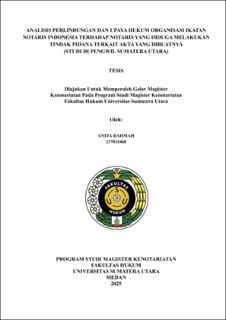| dc.description.abstract | The notary profession serves as a public official with a strategic role in Indonesia's legal system. Its authority is governed by Law Number 30 of 2004 in conjunction with Law Number 2 of 2014 concerning the Notary Position (UUJN), and it is also bound by the Notary Code of Ethics (KEN) established by the Indonesian Notary Association (INI). However, the increasing number of alleged criminal cases involving notaries in North Sumatra-such as falsification of statements in deeds-raises serious concerns regarding the effectiveness of legal protection provided by INI and the alignment between legal norms and their implementation in practice.
This study aims to analyze the application of the UUJN and the Code of Ethics to notaries suspected of criminal offenses and to evaluate both criminal and civil liability concerning the deeds they produce. It also investigates the extent of the role played by INI, particularly the Regional Board of North Sumatra, in providing assistance and legal protection to notaries.
Employing an empirical juridical approach and qualitative methods, this research combines literature studies of the Criminal Code (KUHP), Criminal Procedure Code (KUHAP), UUJN, and INI documents, with interviews involving six informants including INI board members, law enforcement officials, and members of the Notary Honorary Council (MKN).
The results reveal that the legal protection afforded by INI is not yet optimal in practice. A significant gap persists between the applicable legal norms and their actual implementation, exacerbated by limited resources, weak advocacy efforts, and ineffective coordination between INI, the Notary Honorary Council (MKN), and law enforcement agencies. Despite a strong legal foundation through the UUJN and the Code of Ethics, the role of INI in providing legal assistance, advocacy, and mediation remains insufficient. The study concludes that the synchronization between the UUJN, the Notary Code of Ethics, and INI's protective practices is still weak. Structural reform and enhanced organizational advocacy capacity are urgently needed to ensure legal certainty and justice for notaries. | en_US |


